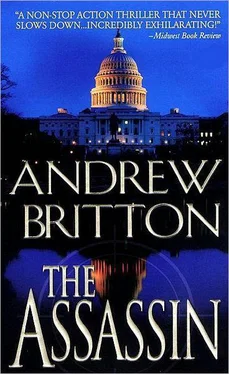Andrew Britton - The Assassin
Здесь есть возможность читать онлайн «Andrew Britton - The Assassin» весь текст электронной книги совершенно бесплатно (целиком полную версию без сокращений). В некоторых случаях можно слушать аудио, скачать через торрент в формате fb2 и присутствует краткое содержание. Жанр: Триллер, на английском языке. Описание произведения, (предисловие) а так же отзывы посетителей доступны на портале библиотеки ЛибКат.
- Название:The Assassin
- Автор:
- Жанр:
- Год:неизвестен
- ISBN:нет данных
- Рейтинг книги:3 / 5. Голосов: 1
-
Избранное:Добавить в избранное
- Отзывы:
-
Ваша оценка:
- 60
- 1
- 2
- 3
- 4
- 5
The Assassin: краткое содержание, описание и аннотация
Предлагаем к чтению аннотацию, описание, краткое содержание или предисловие (зависит от того, что написал сам автор книги «The Assassin»). Если вы не нашли необходимую информацию о книге — напишите в комментариях, мы постараемся отыскать её.
The Assassin — читать онлайн бесплатно полную книгу (весь текст) целиком
Ниже представлен текст книги, разбитый по страницам. Система сохранения места последней прочитанной страницы, позволяет с удобством читать онлайн бесплатно книгу «The Assassin», без необходимости каждый раз заново искать на чём Вы остановились. Поставьте закладку, и сможете в любой момент перейти на страницу, на которой закончили чтение.
Интервал:
Закладка:
“Twelve dead?” Raseen seemed strangely unnerved by the possibility, as if realizing for the first time the scope of what they had started. “Is it possible?”
“It’s possible,” Vanderveen conceded. The fact that 12 people — including 4 Americans — had died in the attack did not bother him in the least. In fact, it was a positive turn of events. American casualties would only serve to cloud the president’s judgment, provoking him into an emotional response when the assassins were identified as Iranian nationals. That much may have happened already; in a case such as this, enormous pressure would be placed on the French security service to come up with quick answers.
Of course, the fact that the killers were Iranian would only lead to suspicion, nothing more. It was al-Douri’s asset in New York who would support the idea that Tehran was working behind the scenes to destroy the nascent Iraqi government and undermine U.S. policy in the Middle East. Once the accusation became public, the Iranian president would undoubtedly incriminate himself by veiling his denial of wrongdoing with his usual rhetoric. The inflammatory comments he had made in the past would only increase suspicion and remove any lingering doubts.
Killing al-Maliki and Tabrizi was designed to do two things: first, to eliminate the most prominent supporters of the U.S. presence in Iraq, thereby weakening the Shiite-dominated parliament, and second, to fan the flames between radicals on both sides of the Shia-Sunni divide. The second goal had already been largely achieved, despite the fact that al-Maliki had survived the bombing in Baghdad.
Everything they had done so far, however, served only to set the stage; success hinged entirely on the upcoming meeting at the UN. With the assassination of the core leaders of the Shiite alliance in New York, the National Assembly — the Iraqi parliament — would lose all credibility, and the country would fall into complete disrepair, giving al-Douri the perfect opportunity to snake his way back into power. Promises had already been made, money exchanged. The attack on U.S. soil would be immediately followed by an unprecedented wave of violence in Iraq, propagated by Syrian insurgents sweeping into the western half of the country. The violence would lead to desperation; that much was inevitable, and with the fear would come the search for established leadership, the search for a steady hand. A well-known Sunni candidate had already been earmarked for advancement, and with his ascension, al-Douri would return to the seat of power. He would be forced to wield his authority behind the scenes, of course, but it would be his nonetheless, and few would dare to oppose him. Memories were long in the Middle East, and the men who now represented U.S. interests would quickly fall back into line once the Baathists returned to the beleaguered capital.
This much had been explained to Vanderveen days earlier, whispered while al-Umari’s body was cooling on the second floor of the house in Tartus. It was hugely ambitious, and the plan was strewn with obvious flaws. If the U.S. government took the bait and held Iran responsible, it could very well lead to open conflict. Troops would be pulled out of Iraq to support the offensive, but ultimately, the United States would gain yet another foothold in the region, however precarious. When Vanderveen had pointed this out, the Iraqi had waved it away with mild irritation.
“How can things be any worse?” he had argued. “The Americans have already taken all that was ours. Let the Iranians suffer as well. That is their concern. Our opportunity is here and now, and it must be seized, whatever the consequences.”
During this speech, Vanderveen revealed none of his doubts, which were as real as al-Douri’s monstrous ego. The former vice president was as irrational and narrow-minded as his peers, but he was not a man to cross. With al-Umari’s final contribution, al-Douri now had the financial ability to track him to the ends of the earth, and Vanderveen had no desire to spend the rest of his life looking over his shoulder. None of that really mattered, though, because he wanted to go through with it. He had taken the money, but that was not a mitigating factor, and it did nothing to secure his allegiance; Izzat al-Douri had made him a wealthy man, but Vanderveen was no more indebted to the Iraqi than he was to the country that had trained him to kill. What pushed him on was not what he could buy with the money, but what he could accomplish with it.
A total of twenty million dollars. He had not had much time to think about it since the agreement was struck, but now, as the Audi swept toward the lights of Calais, the sum rattled around in his head, pinging off the possibilities, illuminating the darkest corners of his mind. As the road narrowed and the buildings grew large around him, he was engaged in what had once been dreams. His dreams were as ambitious as any man’s, but they were not of the luxuries that the millions could buy. Instead, what consumed him was the memory of a warm September morning in 2001, and the knowledge of what one man had done with nothing more than time, desire, and a fraction of the sum that would soon be sitting in his numbered Zurich account.
“Well, that could have gone better,” Harper said.
They were strolling through the National Mall, which was strangely deserted in early evening. The tourists had retired to their hotels, but the city’s homeless had yet to emerge from the shadows. Kealey felt conspicuous in the borrowed gray suit, and his feet were cramped in black leather loafers that were a size too small. Still, the air felt good after the claustrophobic atmosphere of the White House, cool with a slight breeze coming in from the east. They’d left the executive mansion through the southwest pedestrian gate, making their way down Pennsylvania, past his hotel. Naomi had disappeared without warning; but Kealey had seen Harper murmur a few words in her ear before her sudden departure. He briefly wondered what they had talked about, but now was not the time to bring it up. There were other things on his mind.
The president had received Kharmai’s proposal with a healthy dose of skepticism, but to his credit, had listened carefully as she explained the need to break into the German Embassy, as well as how such a risky maneuver could be successfully pulled off. She had made a convincing case, but in the end, Brenneman had referred once more to the Bureau’s conflicting information, and announced his intention to contact the German chancellor on unofficial terms the following day. It was exactly what they’d hoped to avoid.
“Do you think she’ll cooperate?” Kealy finally asked.
“Chancellor Merkel? I doubt it. She has nothing to gain by investing herself in this mess. Ruhmann will probably get a call from someone in the German cabinet sometime tomorrow afternoon, and he’ll be out of the country in a few hours’ time. Going to Brenneman with this was probably a mistake, but it had to be done. We both know that.”
“Maybe so, but we need to stall,” Kealey said quietly, more to himself than anything else. “Once he makes that call tomorrow, it’s out of our hands. Ruhmann is our only lead, John. If anyone knows what Vanderveen’s planning, it’s him.”
“I agree, but I don’t see a way out of this little hole we’ve dug for ourselves. Judd paid us back in spades for that stunt you pulled in Alexandria. I mean, he has a source in the Iranian government, for Christ’s sake. Who would have thought it?”
“It sounds like bullshit. This supposed informant knows a little too much if you ask me. What I don’t understand is why the FBI can’t see that. Nobody has access to that kind of intelligence without being somehow involved.” Kealey paused. “John, we really need to know who this guy is. More to the point, we need to know who he’s talking to in the Bureau. Maybe we can get some kind of access.”
Читать дальшеИнтервал:
Закладка:
Похожие книги на «The Assassin»
Представляем Вашему вниманию похожие книги на «The Assassin» списком для выбора. Мы отобрали схожую по названию и смыслу литературу в надежде предоставить читателям больше вариантов отыскать новые, интересные, ещё непрочитанные произведения.
Обсуждение, отзывы о книге «The Assassin» и просто собственные мнения читателей. Оставьте ваши комментарии, напишите, что Вы думаете о произведении, его смысле или главных героях. Укажите что конкретно понравилось, а что нет, и почему Вы так считаете.












